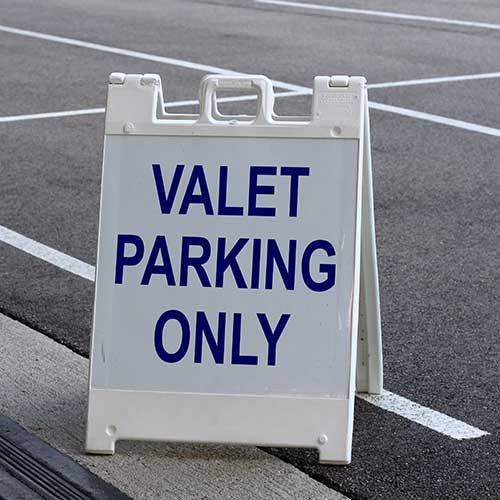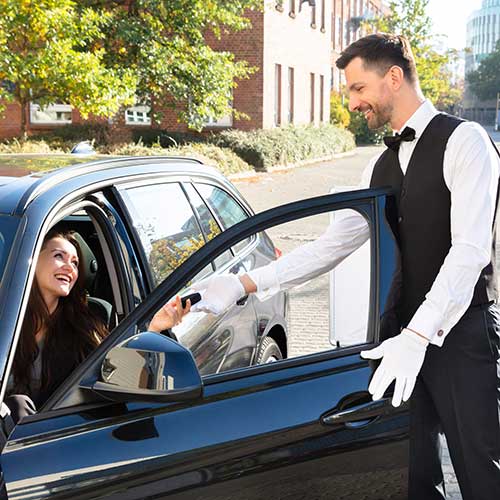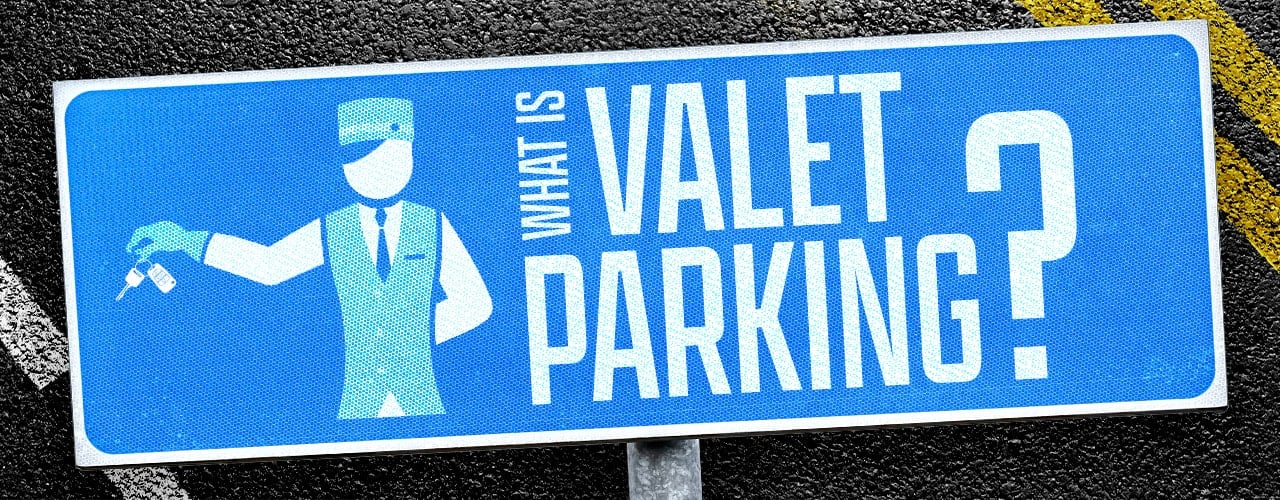If you've ever worked in the hospitality industry, chances are you've heard the term valet parking. However, many people may not be aware of what valet parking actually is or what it consists of. Whether you’re looking to start your own parking service or just want to learn more about hospitality, understanding the core concepts of valet parking is essential to your success. In the blog below, we’ll investigate what valet parking is, how it works, and the specifics of the job.
What Is Valet Parking?

Valet parking is a service offered in many types of hotels and high-end restaurants. When a guest arrives, they turn over their car keys to an employee who greets them, takes their keys, and parks their car. Later in the night when the guest is ready to leave, an employee retrieves their car for them and sends them on their way. Although some valet services may be offered free of charge, most require guests to pay a small fee beforehand. Cost is ultimately decided based on management's preferences.
While valet parking can be offered anywhere, it is particularly useful in cities or suburban areas that may have limited parking. Additionally, it is a convenient service to provide for larger events. Some key benefits of starting a valet parking service include:
- Increased control over your parking lot: A valet service gives you influence over where certain types of guests are parked. For example, you can place guests on extended stays near each other, freeing up the rest of your lot. Furthermore, in the event of inclement weather or construction, you can keep vehicles protected.
- Reduced risk: By handing control of parking over to your valet service, you can significantly reduce the risk of accidents happening in your parking lot.
- Easy group access: When it comes to hosting a conference, meeting, or gathering, a valet service makes it easy to cater to large groups and stay organized as they arrive.
- Alleviated traffic: By parking your guest’s cars, you can significantly reduce the amount of traffic in your parking lot. Valet drivers will know exactly where to park, reducing the number of people looking for a parking space.
What Is a Valet?

A valet is the employee responsible for driving, parking, and retrieving guests’ cars. Their presence helps to cultivate a welcoming environment in your hotel or restaurant and contributes to creating a helpful and positive atmosphere.
In most cases, the minimum requirements to become a valet are a valid driver’s license, a clean driving record, and the ability to provide customer service. Some establishments may ask that their valets stay up-to-date on the business and surrounding area in the event that a guest needs questions answered. Furthermore, certain hotels may require their valets to have previous experience in the hospitality industry.
How Much Do Valet Parkers Make?
Most valet parkers make somewhere between $20,000 and $40,000 annually, although this range can vary depending on several factors. It’s important to note that many valet parkers get paid hourly rather than a fixed salary, which can range from as low as $9/hour to as high as $15/hour. The national average for a valet parker is reported at just over $24,000 per year or $12/hour.
How Much Do Valet Parkers Make In Tips?
In general, it is customary to tip a valet for their services. Depending on where you live, you may be expected to tip them both when they park your car as well as when they retrieve it. In the United States, the average valet tip ranges from $2-$5 per service.
How to Start a Valet Parking Service
Starting a valet service in your restaurant can seem confusing at first. Before proceeding, you'll need to assess your budget, property, and staff to see if it is a viable option. To start your own valet parking service, follow the steps listed below:
1. Shop for Insurance
The parking industry can be high-risk, and anything from a small dent to a full collision can result in your business having to pay a large amount of money. For that reason, you must shop for adequate insurance coverage before you begin offering valet services. Take time to reach out to different insurance agencies, making sure to choose the plan that best fits your needs. Rates can vary depending on different factors and change over time, so be sure to stay updated on any changes to your coverage.
A good valet parking insurance plan should cover the following areas:
- General liability: This covers any injury that a person may sustain because of your valet service.
- Garage keepers liability: This covers any damage that a car may sustain while in the care of your valet service. Additionally, it can cover any theft or collisions that may occur.
- Workers' compensation: In the event that a valet is injured while on the job, workers' compensation insurance provides coverage. Not only are you responsible for damages, but also for any wages lost due to time away with injury.
2. Buy Professional Valet Parking Equipment
To position your parking service for success, consider investing in professional valet equipment. Creating an organized and presentable valet area helps to keep your staff working efficiently and create a professional atmosphere. Some of the most common types of valet equipment include:

- Valet podium: The valet podium is where your valet staff stands when they aren’t parking or retrieving cars. Depending on the podium you choose, it can feature additional storage space or a built-in tip box.
- Key box: Keeping guests’ car keys safe should be a priority for any valet service. To do so, consider investing in a safe or key box. These boxes allow you to store several keys at once and keep them secured until it is time to retrieve a guest’s car.
- Valet umbrellas: A valet umbrella keeps your valet staff safe from the sun, rain, or any other weather that might affect them. Furthermore, they make it easier for guests to identify where your valets are stationed.
- Valet tickets: A valet ticket allows you to keep track of your guests and what car they drive. Your employees can fill out the ticket and give it to the guest upon their arrival, simplifying the process of retrieving their car when they return.
3. Hire Staff
Whether you run a restaurant or a hotel, any business that offers valet services should invest heavily in its staff. Having quality employees is essential to your success, not just when it comes to cars, but also when it comes to creating a positive experience for your guests. For many people, their interaction with your valet staff may be their first impression of your business.
Making an effort to establish a thorough hiring process can pay off in the long run. Be sure to select candidates with a clean driving record, exemplary customer service skills, and a strong work ethic. It's also important to design a detailed training program to make sure each new hire is prepared to do their job.
4. Designate a Valet Parking Area
Before you can begin taking care of guests' cars, you’ll need to designate an area to park them. This can either be a segment of your existing parking lot or a newly constructed area. Choose a spot that is easy to access, offers ample room for parking, and is safe from any potential hazards. Additionally, remember to clearly mark this area to ensure it is only used for valet parking.
No matter what kind of hospitality business you manage, a valet parking service is a useful amenity to offer your guests. By educating yourself on how a valet service works, the valet position itself, and how you can start a service of your own, you'll be able to improve the quality of your business and create a better customer experience.



